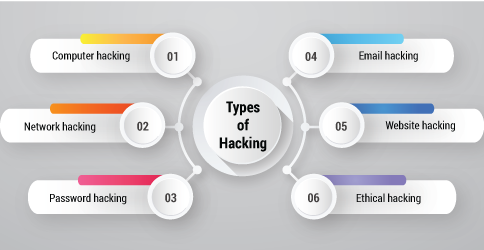We have all heard of the word ‘Hack’. This is a term often related to electronics and electronic devices. Everybody is familiar with the term hacking because everyone is connected to the internet today, everyone uses their cell phones, PC’s or laptop devices for everyday needs. Today we will talk in detail about what exactly is hacking, what are the types of hacking and how exactly does it work?
Table of Contents
What is Hacking?
Simply put, Hacking is the practice of gaining access to unauthorized systems, networks, or devices by using technical skills. It can involve using special software or techniques to bypass security measures and gain access to information or resources that are not normally available. Hacking can be done for a variety of reasons, such as to steal sensitive information, to disrupt or disable systems, or to test the security of a system or network.

Hacking can be done using a variety of tools and methods, and it requires a certain level of knowledge and expertise in computer systems and networks. It’s important to note that hacking is generally considered to be illegal, and it can have serious consequences for both the individual hacker and the victim of the hack. Many organizations and governments take steps to protect against hacking, including implementing strong security measures and educating employees and users about how to stay safe online.
Types of Hacking

There are many different types of hacking, and the specific methods used can vary depending on the goals of the hacker and the nature of the target system or network. Some common types of hacking include:
- Password cracking: This involves using special software or techniques to guess or “crack” the password of an account or system. Hackers may use dictionary attacks, which try a large number of common passwords, or they may use more sophisticated methods like rainbow tables or brute force attacks, which try every possible combination of characters.
- Phishing: This involves tricking people into giving away sensitive information, such as login credentials or financial data, by pretending to be a trustworthy entity. Hackers may send fake emails or create fake websites that look legitimate in order to lure victims into giving away sensitive information.
- Social engineering: This involves manipulating people into divulging sensitive information or performing actions that may compromise security. Hackers may use a variety of tactics, such as pretending to be someone else, using fear or urgency to persuade the victim, or leveraging trust or authority.
- Malware injection: This involves using malware, such as viruses, worms, or Trojans, to gain access to or control over a system. Hackers may use malware to steal sensitive information, to disrupt or disable systems, or to gain a foothold from which to launch further attacks.
- Zero-day exploit: This involves using a previously unknown vulnerability in a system or application to gain unauthorized access. Hackers may discover and exploit zero-day vulnerabilities in order to gain access to sensitive information or to disrupt or disable systems.
Types of Hacker

There are several types of hackers, and the specific type of hacker often depends on their motivations and the methods they use. Some common types of hackers include:
- White hat hackers: These are ethical hackers who use their skills to identify vulnerabilities in systems and help organizations fix them before they can be exploited by malicious hackers. White hat hackers often work for organizations in a security-related capacity or as consultants.
- Black hat hackers: These are malicious hackers who use their skills to gain unauthorized access to systems or steal sensitive information. Black hat hackers often operate with the intention of causing harm or obtaining personal gain.
- Gray hat hackers: These hackers fall somewhere between white hat and black hat hackers. They may use their skills to identify vulnerabilities in systems, but they may also exploit those vulnerabilities for personal gain or to cause harm.
- State-sponsored hackers: These are hackers who are sponsored by a government to carry out cyber attacks against other countries or organizations.
- Script kiddies: These are inexperienced hackers who use pre-written scripts or tools to launch attacks without a deep understanding of how they work.
- Hacktivists: These are hackers who use their skills to promote a political or social cause. They may carry out cyber attacks against organizations or governments in order to draw attention to their cause.
Risks of Hacking

There are several risks associated with hacking, both for the individual hacker and for the victim of the hack. Some of the risks of hacking include:
- Legal consequences: Hacking is generally considered to be illegal, and it can carry serious legal consequences. Depending on the severity of the hack and the jurisdiction, a hacker may face fines, imprisonment, or both.
- Reputational damage: A hack can damage the reputation of both the individual hacker and the victim of the hack. For the victim, a hack can damage the trust of customers, partners, and other stakeholders, which can lead to financial losses and other negative consequences.
- Personal consequences: A hacker may face personal consequences as a result of their actions, such as loss of employment or social ostracism.
- Financial losses: A hack can result in financial losses for the victim, such as the cost of repairing or replacing damaged systems, the cost of recovering stolen data, and the cost of legal fees.
- Loss of sensitive information: A hack can result in the theft of sensitive information, such as personal data, financial data, or intellectual property. This can have serious consequences for the victim, including financial losses and damage to reputation.
We hope this post was useful.
Related: Is software piracy safe?
Please do let us know if you like the post in the comments below.
Thank you!
